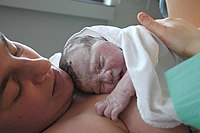
Interventions during pregnancy to prevent spontaneous preterm birth: an overview of Cochrane systematic reviews
Sign Up to like & getrecommendations! Published in 2017 at "Cochrane Database of Systematic Reviews"
DOI: 10.1002/14651858.cd012505
Abstract: This is a protocol for a Cochrane Review (Overview). The objectives are as follows: Our objective is to produce an overview of the evidence in the Cochrane Database of Systematic Reviews for antepartum interventions to… read more here.
Keywords: prevent spontaneous; preterm birth; spontaneous preterm; systematic reviews ... See more keywords

Association between change in cervical length and spontaneous preterm birth in twin pregnancies
Sign Up to like & getrecommendations! Published in 2017 at "American Journal of Obstetrics and Gynecology"
DOI: 10.1016/j.ajog.2016.10.002
Abstract: BACKGROUND: There is a lack of consensus on the optimal transvaginal cervical length for determining risk for spontaneous preterm birth in twin pregnancies. Change in transvaginal cervical length over time may reflect early activation of… read more here.
Keywords: length; preterm birth; spontaneous preterm; transvaginal cervical ... See more keywords

Analytical validation of protein biomarkers for risk of spontaneous preterm birth
Sign Up to like & getrecommendations! Published in 2017 at "Clinical Mass Spectrometry"
DOI: 10.1016/j.clinms.2017.06.002
Abstract: Abstract Presented are the validation results of a second-generation assay for determining the relative abundances of two protein biomarkers found in maternal serum that predict an individual’s risk of spontaneous preterm birth. The sample preparation… read more here.
Keywords: validation; preterm birth; spontaneous preterm; risk spontaneous ... See more keywords

IS SPONTANEOUS PRETERM DELIVERY ASSOCIATED WITH IMPAIRED VASCULAR FUNCTION
Sign Up to like & getrecommendations! Published in 2018 at "Journal of the American College of Cardiology"
DOI: 10.1016/s0735-1097(18)33207-8
Abstract: Spontaneous preterm delivery (sPTD) is associated with an increased risk of CVD later in life, but causes of this phenomenon are not well understood. The aim of this study was to assess vascular function over… read more here.
Keywords: delivery; spontaneous preterm; preterm delivery; vascular function ... See more keywords

Cervicovaginal microbiota and local immune response modulate the risk of spontaneous preterm delivery
Sign Up to like & getrecommendations! Published in 2019 at "Nature Communications"
DOI: 10.1038/s41467-019-09285-9
Abstract: Failure to predict and understand the causes of preterm birth, the leading cause of neonatal morbidity and mortality, have limited effective interventions and therapeutics. From a cohort of 2000 pregnant women, we performed a nested… read more here.
Keywords: cervicovaginal microbiota; local immune; microbiota; spontaneous preterm ... See more keywords

Quantitative fetal fibronectin to predict spontaneous preterm delivery after laser surgery for twin-twin transfusion syndrome
Sign Up to like & getrecommendations! Published in 2019 at "Scientific Reports"
DOI: 10.1038/s41598-019-41163-8
Abstract: Our goal was to assess whether quantitative fetal fibronectin (qfFN) is associated with spontaneous preterm birth (sPTB) after laser surgery for twin-twin transfusion syndrome (TTTS). qfFN was collected within 24 hours before and after laser surgery.… read more here.
Keywords: surgery; spontaneous preterm; laser surgery; fetal fibronectin ... See more keywords

Cervicovaginal natural antimicrobial expression in pregnancy and association with spontaneous preterm birth
Sign Up to like & getrecommendations! Published in 2020 at "Scientific Reports"
DOI: 10.1038/s41598-020-68329-z
Abstract: There is much interest in the role of innate immune system proteins (antimicrobial peptides) in the inflammatory process associated with spontaneous preterm birth (sPTB). After promising pilot work, we aimed to validate the association between… read more here.
Keywords: pregnancy; preterm birth; sptb; spontaneous preterm ... See more keywords

Uterocervical Angle Measurement Improves Prediction of Preterm Birth in Twin Gestation
Sign Up to like & getrecommendations! Published in 2018 at "American Journal of Perinatology"
DOI: 10.1055/s-0037-1608877
Abstract: Objective Twin pregnancies are associated with an increased risk of spontaneous preterm birth. Our objective was to compare the performance of uterocervical angle to cervical length as predictors of spontaneous preterm birth in this population.… read more here.
Keywords: uterocervical angle; preterm birth; spontaneous preterm; cervical length ... See more keywords

Association between the first and second trimester cell free DNA fetal fraction and spontaneous preterm birth.
Sign Up to like & getrecommendations! Published in 2023 at "Expert review of molecular diagnostics"
DOI: 10.1080/14737159.2023.2217331
Abstract: OBJECTIVE To evaluate whether the fetal fraction of cell-free DNA at the first and second trimesters is associated with spontaneous preterm birth. METHODS This was a retrospective cohort study with singleton pregnancies who underwent noninvasive… read more here.
Keywords: dna; cell free; fetal fraction; fraction ... See more keywords

Characterization of methylation profiles in spontaneous preterm birth placental villous tissue
Sign Up to like & getrecommendations! Published in 2022 at "PLOS ONE"
DOI: 10.1101/2021.04.26.441471
Abstract: Preterm birth is a global public health crisis which results in significant neonatal and maternal mortality. Yet little is known regarding the molecular mechanisms of idiopathic spontaneous preterm birth, and we have few diagnostic markers… read more here.
Keywords: spontaneous preterm; idiopathic spontaneous; dna methylation; preterm birth ... See more keywords

Does previous caesarean section at full dilatation increase the likelihood of subsequent spontaneous preterm birth?
Sign Up to like & getrecommendations! Published in 2018 at "Australian and New Zealand Journal of Obstetrics and Gynaecology"
DOI: 10.1111/ajo.12713
Abstract: There is emerging evidence that caesarean section at full dilatation is associated with an increased risk of subsequent spontaneous preterm birth. read more here.
Keywords: preterm birth; section full; spontaneous preterm; full dilatation ... See more keywords